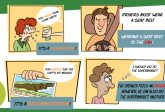Future Continuous
This time next week I’ll be lying on the beach drinking a nice cool beer! I wish that were true. Unfortunately, this time next week I’ll be sitting at my desk working. Oh well, that’s life!
In the sentence “This time next week I’ll be lying on the beach drinking a nice cool beer” we are using the future continuous tense. The future continuous is another one of the many tenses of the English language. If you want a quick overview of the tenses, check out the 12 Basic English Tenses over at English Club
Future Continuous - Form
We form the future continuous by using the auxiliary verb will together with the infinite be and the present participle of the main verb. We normally contract the subject and will (I will = I’ll) especially in conversation.
Look at these examples:
This time next week I’ll be lying on the beach.
We’ll be sleeping at 2am.
She’ll be driving to work at 8:30 tomorrow morning.
As you can see in the box below, the form is the same for all the persons.
To make a negative statement we use the word not after the auxiliary verb will. We normally use the contraction of will and not which is won’t.
Look at these examples:
I won’t be working at this time tomorrow.
He won’t be living here at Christmas time.
They won’t be joining us for dinner.
To make a question we simply place the auxiliary verb before the subject.
Look at these examples:
Will you be sleeping at midnight tonight?
Will she still be living here in January?
What will you be doing at this time tomorrow?
Future Continuous - Positive Statements
To form a positive statement in the future continuous we use will + be + present participle
I will be working
You will be working
He will be working
She will be working
It will be working
We will be working
You will be working
They will be working
Future Continuous - Negative Statements
To form a negative statement in the future continuous we use will + not + be + present participle
I will not be working
You will not be working
He will not be working
She will not be working
It will not be working
We will not be working
You will not be working
They will not be working
Future Continuous - Questions
To form a question in the future continuous we use the structure will + subject + be + present participle
Will I be working?
Will you be working?
Will he be working?
Will she be working?
Will it be working?
Will we be working?
Will you be working?
Will they be working?
Future Continuous - Use
We use the future continuous tense to talk about an action that will be in progress at a particular time in the future. To help us understand, we can compare the future continuous to the present continuous.
If I say “I am working” it describes an action that is in progress at the moment.
If I say “I will be working at 11am tomorrow” it describes an action that will be in progress at at 11am tomorrow.
The statement “I will be working at 11am tomorrow” does not mean I will begin working at 11am tomorrow. Maybe I will begin to work at 9am and finish at 5pm. So if I am talking about a time between 9am and 5pm I can say ” I will be working at…”. We normally state a specific time when we use the future continuous.
For example, if a friend says:
“I’ll call you at 10 tomorrow morning”
I could reply:
“Don’t call me at 10, I’ll be working. You can call me at one o’clock. I’ll be on my lunch break. I won’t be working then.”
We often use the expression “this time next week/month/year” with the future continuous. For example, if it is Tuesday morning at 11am and I am working but next week I am going on holiday to Spain, I could say:
This time next week I’ll be lying on a beach in Spain.
Here are some more examples:
This time next year she’ll be living in London.
This time next month we’ll be celebrating Christmas.
This time tomorrow I’ll be driving to Galway.
Test Yourself
Vocabulary
Contraction:Two words joined together using an apostrophe. For example: I’ll, she’s, won’t etc
The present participle: The ‘ing’ form of a verb when used with the verb ‘to be’ to form tenses. For example: She’s eating, we’re swimming, he’s walking.
To celebrate: To commemorate with festivities. For example: She’s celebrating her birthday next Saturday.
Idioms
That’s life!: We say this after something unlucky or bad has happened. It suggests that these things are part of life that we have to accept. We also use the French language version of this idiom in English, C’est la vie!. For example: My bicycle was stolen. That’s life! I lost my job. C’est la vie!
Thank you for reading our post. You’ll find more English grammar tips elsewhere on our site and if you’d like information on our English courses in Dublin, please do not hesitate to contact us.




